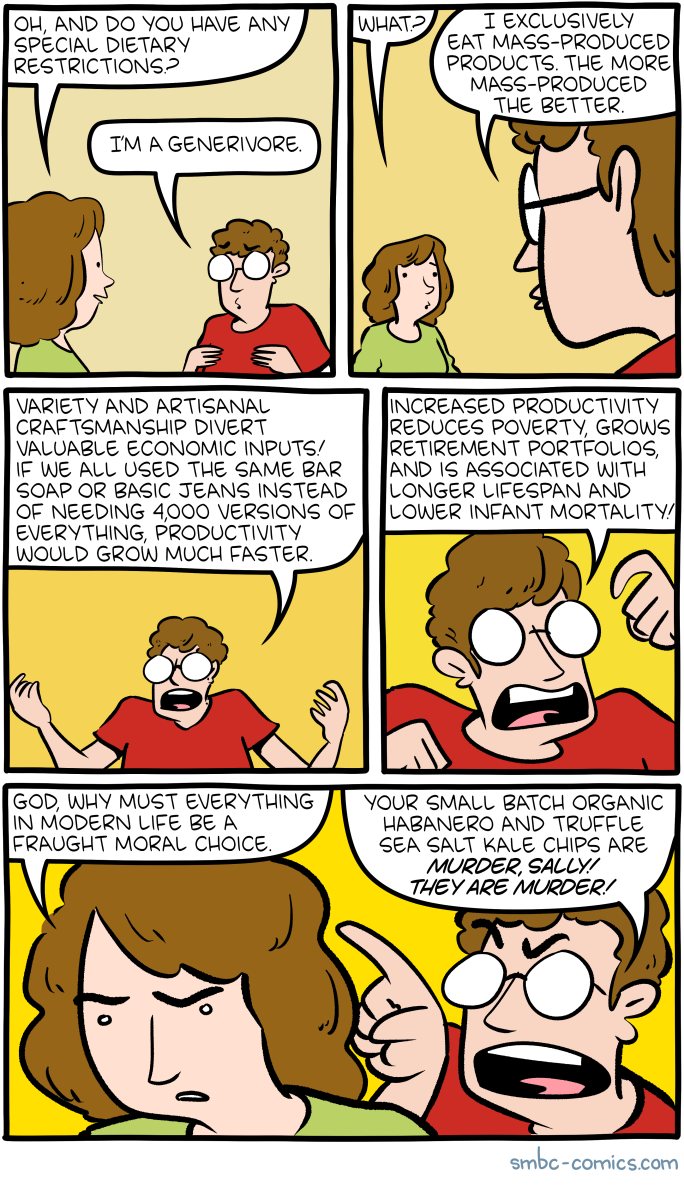this post was submitted on 01 Dec 2023
533 points (96.8% liked)
Comic Strips
12611 readers
3038 users here now
Comic Strips is a community for those who love comic stories.
The rules are simple:
- The post can be a single image, an image gallery, or a link to a specific comic hosted on another site (the author's website, for instance).
- The comic must be a complete story.
- If it is an external link, it must be to a specific story, not to the root of the site.
- You may post comics from others or your own.
- If you are posting a comic of your own, a maximum of one per week is allowed (I know, your comics are great, but this rule helps avoid spam).
- The comic can be in any language, but if it's not in English, OP must include an English translation in the post's 'body' field (note: you don't need to select a specific language when posting a comic).
- Politeness.
- Adult content is not allowed. This community aims to be fun for people of all ages.
Web of links
- [email protected]: "I use Arch btw"
- [email protected]: memes (you don't say!)
founded 1 year ago
MODERATORS
you are viewing a single comment's thread
view the rest of the comments
view the rest of the comments


I've seen this argument pushed unironically, and quite convincingly.
It of course depends on a lot of factors, and GHG emissions are not the only concern, but "short-circuit" consumption can (apparently, I did not run the numbers myself and read this a few years ago) emit much more CO2 than importing food from far away... simply because driving a car for 10 km to a farm for a bag of apples (or whatever) is a LOT worse per apple than the traditional container-on-ship->container-on-rail->semi-truck->local store supply chain which has a few times the fuel consumption of a car... but multiple orders of magnitude more cargo.
This is in reality not so much a dig on short-circuit consumption, which is obviously overall good, than a dig at how polluting cars are, even compared to cargo ships whose emissions we intuitively over-estimate. Still, it has stuck with me as a good example of the complexity of making a life-cycle emissions assessment.
Modern globalized economies are also often criticized to have gone too far into economies of scale, making them very brittle... as we saw in 2020/2021, as farmers re-discover every time one illness destroys an entire country's mono-culture, and as we fear we may discover soon with TSMC.
Furthermore almost every country (even very economically liberal ones like the US) heavily subsidizes their local agricultural sector to shield them from foreign competition, as it is of the utmost national security importance that a blockade on agricultural imports could not result in widespread famine.
Uh. Do you think those semi trucks are bringing apples right into people's homes? Guess how far the grocery store is from people's houses lmao
That argument only works if every citizen in the country lives in high density, transit enabled city cores.
IIRC the hypothetical scenario assumed you had a supermarket on your side of town (say 1 km) but had to to on the other side of town to get to a local farm (say 10-15 km). As a suburbanite this seems quite reasonable to me on both fronts.
Or in a small walkable town. They exist. You don't need a 100,000 people city to have easy access to apples.